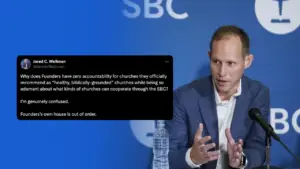I have spent the last two weeks on 2 continents in 2 countries and 3 major cities in the 10/40 window. Every time I travel in last frontier areas where Southern Baptists have workers trying to penetrate the spiritual darkness with the light of the gospel I experience true ambivalence. On the one hand I am humbled by the character and labors of those who have chosen to live in hard places in order to make Christ known. And I am deeply grateful for the cooperative efforts of Southern Baptists in sending and servicing such devoted workers. We have an ingenious method of supporting gospel workers on the field. On the other hand, I always come away with a sense that we can do better. We can give more, send more and reach further than we currently are if we are willing to reorder our priorities.
As I prepare to leave this region of the world and return home, those old feelings have come back. I have been incredibly impressed with the gospel work that is taking place here and being overseen from here. And I have been frustrated by the fresh awareness of how much more could be done with more resources–resources that exist but simply are not making it to the field.
I listened to a worker describe cutting funds in his budget for Bibles in the heart language of unreached people due to the financial shortfall facing the IMB. I learned of cutbacks in the number or workers that will be joining the efforts to reach Muslims in this region of the world. I heard of other opportunities that could be pursued if only money were available.
Southern Baptist churches should undoubtedly give more to the work of missions. But the truth is, we are already giving enough to overcome the kinds of cutbacks that our workers on the field are experiencing. Our problem is that not enough is making it to the places where it is needed most.
Let me explain.
In 2008 Southern Baptist churches gave $548,205,099 to finance gospel efforts through the Cooperative Program (CP). Of that amount, only $204,385,593 (37%) made it to offices in Nashville to be distributed to causes in the Southern Baptist Convention (SBC) Annual Budget. This means that state conventions of the SBC retained, on average, 63% (nearly $344,000,000) of all offerings that were designate from the churches for the Cooperative Program.
The SBC’s Allocation Budget for the CP apportioned 50% of all money received to the International Mission Board, 22.79% to the North American Mission Board (NAMB), 22.16% to theological education, 3.40% to facilitating ministries and 1.65% to the Ethics & Religious Liberty Commission.
That means that Southern Baptists, through the CP, allocated only $102,000,000 to reach the nations in 2008 (the IMB also received $141 million through the 2008 Lottie Moon offering). If state conventions had kept only 50% of all CP funds that year, an additional $88,000,000 would have made it to the SBC budget, resulting in an additional $44,000,000 for the IMB to use in our efforts to reach the nations.
I have no interest in debating the merits of state conventions. I know they do some very valuable things. My own state convention is heavily involved in assisting in the relief work in Haiti. But it is beyond dispute that some of what state conventions do is unnecessary (listen to this talk by Mike Day, DOM of the Mid-South Baptist Association in Memphis, TN) and could be scaled back in order to free up more funds to reach unreached people groups of the world. Without getting into the specifics of all this, I would like to propose that the churches of the SBC instruct their state conventions to operate on smaller budgets. Specifically, I suggest that churches call on their state conventions to operate on no more than 50% of CP funds forwarded to them from local congregations.
Let’s keep no more than 50% of CP offerings in the state, and designate no more than 50% of what goes to Nashville for convention-wide ministries within the USA with the remaining 50% or more distributed to the IMB for the nations. To my mind, this seems only equitable.
Equity for the nations. Let’s call for it. Let’s work for it.




















